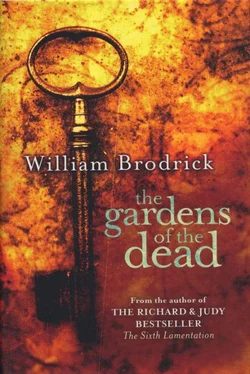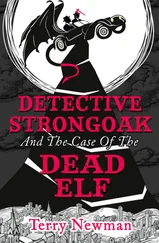William Brodrick - The Gardens of the Dead
Здесь есть возможность читать онлайн «William Brodrick - The Gardens of the Dead» весь текст электронной книги совершенно бесплатно (целиком полную версию без сокращений). В некоторых случаях можно слушать аудио, скачать через торрент в формате fb2 и присутствует краткое содержание. Жанр: Триллер, на английском языке. Описание произведения, (предисловие) а так же отзывы посетителей доступны на портале библиотеки ЛибКат.
- Название:The Gardens of the Dead
- Автор:
- Жанр:
- Год:неизвестен
- ISBN:нет данных
- Рейтинг книги:4 / 5. Голосов: 1
-
Избранное:Добавить в избранное
- Отзывы:
-
Ваша оценка:
- 80
- 1
- 2
- 3
- 4
- 5
The Gardens of the Dead: краткое содержание, описание и аннотация
Предлагаем к чтению аннотацию, описание, краткое содержание или предисловие (зависит от того, что написал сам автор книги «The Gardens of the Dead»). Если вы не нашли необходимую информацию о книге — напишите в комментариях, мы постараемся отыскать её.
The Gardens of the Dead — читать онлайн бесплатно полную книгу (весь текст) целиком
Ниже представлен текст книги, разбитый по страницам. Система сохранения места последней прочитанной страницы, позволяет с удобством читать онлайн бесплатно книгу «The Gardens of the Dead», без необходимости каждый раз заново искать на чём Вы остановились. Поставьте закладку, и сможете в любой момент перейти на страницу, на которой закончили чтение.
Интервал:
Закладка:
So, thought Nick, watching homely lights spread across the fields, you made a friend of your opponent, you stored what you found in secret, and you gave the key to a monk. He felt acutely awake, though tired. He forced his mind to plod on one or two steps and, like a reward, he came to the real mystery. He gazed ahead, as if he’d stumbled on the source of the Nile: Elizabeth had started this collection at the conclusion of the trial, when she could not have anticipated the death of John Bradshaw, or the letter from his mother. Why then, had she kept the trial papers in the first place?
At Liverpool Street Nick took the Underground to St John’s Wood, musing upon a chain of intuitions: there was a link between the evolution of Elizabeth’s secret and her desire to keep Nick close to home; at the same time, Nick’s father had been urging him to visit Australia. Did he know of his wife’s subterfuge? Nick had little doubt: he did not. His father was guileless. His unthinking candour had compromised numerous commercial transactions spanning several continents – the last of which had led to his enforced retirement. He could not be relied upon – least of all with the truth. It made another question all the starker: how might anything be so important to Elizabeth that she could not share it with the man she trusted most?
Once home he walked straight to the Butterfly Room determined to confirm his father’s exclusion from the meaning of the key Charles looked up from an armchair as if he’d seen a well-loved moth. He had an empty glass in his hand.
‘Where’ve you been?’ His face was flushed and he was tipsy.
‘I just went walkabout.’
‘Me too.’
‘Whereabouts?’ Nick noticed the bow tie, a remnant from his father’s banking days. He’d worn a bowler hat to work. His suits had been cut from heavy cloth that made him perspire. But he’d looked the real shilling – as if he were hot with responsibility.
‘Regent’s Park. And you?’
‘Sudbury.’
‘Where?’
‘Suffolk.’
‘Good God.’
Nick studied his father’s wounded face. The dear man knew nothing. What had he thought about in Regent’s Park? It was easy to surmise: his wife’s evasiveness and stealth, which, of late, he had noticed; the manner of her going; and consolation from a police officer whom he did not know He was bewildered and Nick could not help him – because he held the key It gave him knowledge, but of a kind he couldn’t share.
Nick woke and listened to the rubbish truck and the antics of the binmen. He swung his legs out of bed and reached for his mobile. After considerable hesitation, he rang a monastery.
7
Blind George, as he was known, woke up on a traffic island. He was lying on a bench. Marble Arch towered huge and white behind a litter bin. A flag fluttered, its line slapping against the pole. Above, the sky was misty blue. An aeroplane crossed in silence, like an ant on lino. George sat up, with a groan, and opened his notebook. A thumb with a cracked black nail smoothed back the pages. He read out loud:
I am going to Mile End Park to confront Riley.
Wait beneath the fire escape in Trespass Place.
The explanation for Inspector Cartwright is in your left inside jacket pocket.
There’s fifty pounds in your right trouser pocket.
Elizabeth.
For years George had kept a record of days gone. Nino, a former traffic warden, had insisted upon the practice. It had been part of his instruction when teaching George about life on the street. Since leaving the world of parking tickets, Nino had moved around the libraries of London, still clutching a floppy pad. He had his own chair in most of the reading rooms. One of them had his name on it – stuck on with tape by the management. He had a habit that drove them to distraction, and kept him on the move: in one place he’d put in a request for a book that was held in another. So all these books were flying about London after Nino, when all he had to do was keep still.
‘Don’t think,’ he’d said. ‘Just write, starting at the beginning, and keep going. You’ll only understand the story looking backwards. If you start thinking, you’ll write the story you want, not the story you’ve got.’
‘Oh.’
‘The street is the place of stories,’ he’d concluded gravely Black, tangled hair covered his face and his skin was grey ‘Stories of harm and stories that heal.’
George had obeyed, because traffic wardens have a peculiar authority. When one notebook was full he’d start another. They were numbered on the cover. He had thirty-eight of them. George’s whole life was laid out in order, all sixty-four years, as best as he could remember them. Almost every day he’d sat on a park bench or in a cafe, and he’d scribbled with haste, not pausing to choose his words. Once he’d got something down, he was like an archaeologist with a toothbrush: he gently brushed away the dirt; he’d change a word or phrase, cleaning up what had been saved. It could take months to get it right.
George’s earliest memory was of an outing in a pushchair. He was sitting behind an improvised cover to keep out the rain. His mother had made it. There was a polythene window sewn into a sort of waxed cotton tent that covered his upper body His protruding legs were warm, covered by a blanket; but he couldn’t see anything because of the condensation. He could hear only the rain and his mother’s feet on the path. They were on their way to see Granddad, whose first name he bore. David. He’d stopped using it a long time ago, out of shame. He’d become George. That burst of anguish took up the first pages of book one, which now lay with all the others in a plastic bag. All them had been filled with a similar, honest desperation: to preserve both the good and the bad. That was something else Nino had said:
‘Don’t decide what to keep. It all counts. Sometimes it is the worst things that turn out to have delivered what is best.’ He’d been solemn again. ‘It only appears when you write it down.’
Filling up these notebooks had a dramatic effect on George. It made him a compassionate observer – not just of himself, but of everyone he’d known. But the scribbling had also made him uneasy about the spoken word, because he’d gone through hell choosing the right ones to keep on paper. Ultimately, the precision had brought him close up to his more recent failures, but without the distortion of self-pity. And then, clear-eyed and calm, he’d scrambled into a skip.
He’d seen two black discs among the wood and bricks: a pair of welding goggles. Instinctively he put them on and pretended to be blind. On the face of it he’d gone mad. But it made sense to George. There were things in his life he could not look upon, and he didn’t want anyone else to either. The street might be the place of stories, but his was going to remain untold. Once the goggles were in place, hardly anyone spoke to him any more. It was as though he wasn’t there. They called him Blind George.
So at first George wrote down his life in order to understand it; but the time came when he did so to keep it together. Long after Elizabeth had found him, and when their project to trap Riley was well underway George got his head kicked in. His memory was sent flying over Waterloo Station like a cloud of pigeons. The details, with Elizabeth’s help, were set down towards the end of book thirty-six. That was after he’d woken to discover that a kind of lake had entered his mind: on the far shore everything was clear, up to the week he’d fallen under those swinging feet; but on this side, where he played out his life, events were like globules of oil. If he didn’t confine them on paper, they could separate, drift off and come back when they felt like it – heavily familiar but incomprehensible. He could hold on to faces, geography and snippets of talk, but he’d found himself in a world where everyone else knew all the missing pieces. People would speak, expecting him to understand. And sometimes he did, but often it was a lottery in which he could make no choices. But it was the keeping of the notebooks that saved him and held everything together. Every page helped to bridge the lake. He just carried on plotting the course of each completed day.
Читать дальшеИнтервал:
Закладка:
Похожие книги на «The Gardens of the Dead»
Представляем Вашему вниманию похожие книги на «The Gardens of the Dead» списком для выбора. Мы отобрали схожую по названию и смыслу литературу в надежде предоставить читателям больше вариантов отыскать новые, интересные, ещё непрочитанные произведения.
Обсуждение, отзывы о книге «The Gardens of the Dead» и просто собственные мнения читателей. Оставьте ваши комментарии, напишите, что Вы думаете о произведении, его смысле или главных героях. Укажите что конкретно понравилось, а что нет, и почему Вы так считаете.












